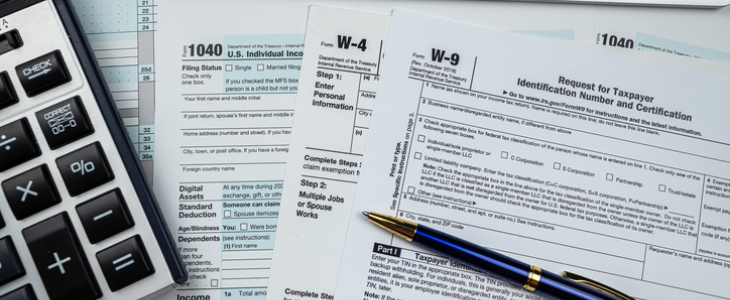Federal tax fraud is a significant offense with far-reaching implications. The consequences of these types of fraudulent violations can be severe. Understanding the different facets of these crimes, the methods used to detect them, and the available defenses is paramount for both individuals and businesses. If you need a criminal defense lawyer for tax fraud charges, book a consultation with our attorneys today.
What Is Federal Tax Fraud?
Federal tax fraud is the act of willfully and knowingly providing false information on tax returns to avoid owed taxes. This can involve practices such as deliberately underreporting income, claiming false deductions, or hiding money in offshore accounts. Such deceitful actions aim to mislead the Internal Revenue Service (IRS) and reduce tax liability. Engaging in tax fraud can lead to severe penalties, including fines and imprisonment.
Common Types of Federal Tax Fraud
Federal tax fraud manifests in various ways, each designed to reduce tax liability unlawfully. One prevalent form is underreporting income, where individuals or businesses deliberately declare less income than they’ve earned, aiming to decrease the amount of tax they owe. Another common method is claiming false or inflated deductions. By exaggerating business expenses or charitable donations, taxpayers attempt to lower their taxable income, thus paying less than their fair share.
Another tactic that some individuals resort to is hiding money in offshore accounts. By keeping substantial amounts in foreign banks or financial institutions, they attempt to evade detection and consequently, taxation by the IRS. Identity theft has also emerged as a significant concern. Those committing fraud illegally use someone else’s Social Security Number to file deceptive returns or claim refunds, causing substantial complications for the legitimate taxpayer and the federal tax system.
Consequences of Federal Tax Fraud
Federal tax fraud is not taken lightly by the U.S. government, and those found guilty can face severe penalties. The legal consequences include substantial fines, which can sometimes amount to more than the original tax owed. In more egregious cases, imprisonment is also a possibility, with sentences ranging from months to several years, depending on the extent and nature of the fraud committed. Beyond the immediate financial and legal penalties, having a tax fraud conviction can lead to the forfeiture of certain professional licenses, rendering some unable to continue in their chosen career.
Beyond the tangible penalties, committing federal tax fraud can have long-lasting personal and reputational damages. Individuals or businesses found guilty may find it challenging to secure loans, mortgages, or other financial services. Their credit scores can be adversely affected, making many financial undertakings more difficult. Moreover, the stigma associated with a fraud conviction can erode personal relationships and trust within the community, affecting both social and professional networks for years to come.
How the IRS Detects Tax Fraud

The IRS employs a multifaceted approach to identify instances of tax fraud. One primary method is the use of sophisticated computer systems that analyze returns for anomalies or discrepancies. If a return deviates significantly from what’s typical for similar taxpayers, it can trigger a review. For instance, large deductions or fluctuating income from year to year without clear justification can raise flags. Additionally, the IRS cross-references the information on tax returns with reports from employers, banks, and other financial institutions to ensure reported income matches received income.
Another vital source of information for the IRS comes from whistleblowers, often employees or acquaintances of those suspected of fraud. The agency has established programs to reward individuals who provide credible and substantial information leading to successful legal actions. Furthermore, routine audits, both random and targeted, play a critical role. Through these audits, the IRS can scrutinize records, receipts, and other relevant documents to ascertain the accuracy and legitimacy of the details provided in the tax returns.
Defending Against Tax Fraud Accusations
Being accused of federal tax fraud can be a daunting experience, but it’s crucial to remember that accusations don’t equate to guilt. The first and most critical step in defending against such charges is to seek competent legal representation. A seasoned attorney, well-versed in tax laws, can help navigate the complexities of the IRS’s claims, scrutinize the evidence, and formulate a robust defense strategy. An attorney can also negotiate on behalf of the accused, potentially resulting in reduced penalties or even having charges dropped entirely.
Defense strategies may vary based on the specifics of the case. Common defenses include demonstrating that any discrepancies were the result of honest mistakes rather than intentional deception. For instance, an oversight in accounting or a genuine misunderstanding of tax laws can be presented as the cause of the discrepancy. Another defense is challenging the evidence or methods used by the IRS, ensuring that all investigative processes are lawful and that the evidence is solid and unambiguous. In any scenario, a strong legal defense is paramount to counter federal tax fraud accusations effectively.
Tips to Prevent Accidental Tax Violations
To avoid unintentional federal tax violations, it’s essential to maintain accurate and detailed financial records throughout the year, ensuring all income and deductions are correctly documented. Regularly consulting with a tax professional or accountant can provide clarity on complex tax laws and offer guidance tailored to individual or business circumstances. Lastly, before submitting any tax returns, it’s wise to double-check all figures and facts, or even consider using reputable tax software that can flag potential issues or inconsistencies.
How a Federal Criminal Attorney Can Assist
A federal criminal attorney possesses the knowledge essential for navigating the intricacies of tax laws and mounting a strong defense against accusations. With their assistance, potential penalties can be reduced, charges might be dropped, or settlements more favorably negotiated. Their invaluable guidance can be the difference between a favorable outcome and severe repercussions. If you’re facing any federal tax issues or accusations, don’t hesitate to contact the Federal Criminal Attorneys of Michigan today to ensure your rights are protected and to give yourself the best chance at a positive resolution.
Federal Criminal Attorneys of Michigan, rooted in Detroit, assists clients with tax fraud charges throughout Lansing, Grand Rapids, Ann Arbor, Flint, and all of Michigan.
